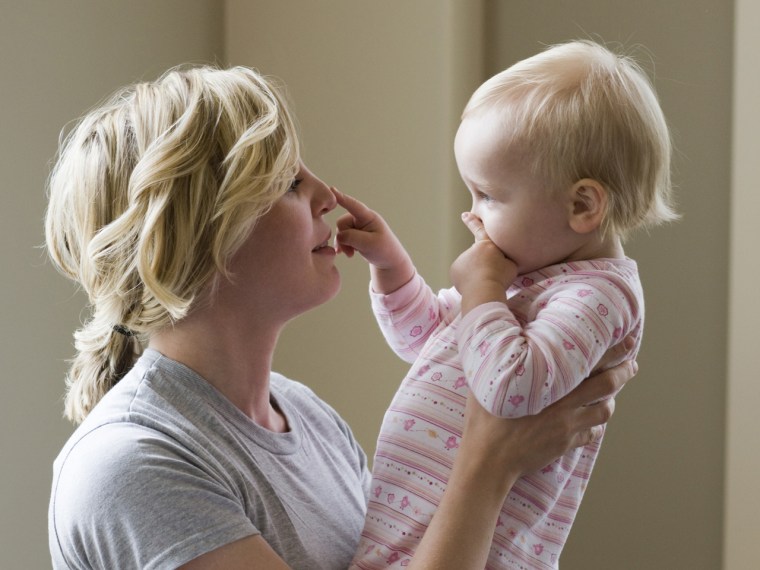It was a proud moment for Karla Helbert when she learned that her young daughter named "vagina" as a "V" word while singing the ABCs with her grandmother during a diaper change.
Helbert taught her daughter, now 5, the correct names for her vagina and vulva when she was younger just as she did with nose and toes, to make it easy for her to say those words that tend bring on the nervous giggles in many adults and kids alike.
“I want her to grow up knowing she has ownership of her body and to not feel ashamed,” Helbert, 42, a counselor in Richmond, Va., told TODAY Moms. “Sometimes when people give all these different names to genitalia, it sort of connotes this sense of shame, that we can’t call this what it really is because it’s bad.”
Hoping to protect her daughter from molestation, she wants her to use the accurate words -- and not nicknames -- to help avoid confusion over what body part she is really talking about and know that it’s OK to talk about any part of her body.

“If they have ownership, that’s going to be one more piece of power they have, so hopefully it will give her the ego strength to say, ‘No, this is my body,’” Helbert said. “I think that starts early on.”
Pediatricians have long urged parents to use teach their children the correct terms for private parts. They're not the only ones trying to empower young children and help prevent sexual abuse.
Kate Rohdenburg, a sexual violence prevention educator who works in the New Hampshire-Vermont border area, spends her days uttering the words “penis” and “vagina” to kids from kindergarten to 12th grade.
The Atlantic featured her work in a recent article, detailing how she taught more than 500 students in public school classrooms in the last year. And she’s explained her reasons for teaching kids the accurate words to hundreds of their teachers and parents, too.
In March, Rohdenburg visited a first grade classroom, talking to 22 squirmy boys and girls about sexual abuse prevention. She discussed consent, empathy, body rights and privacy. She brought diaper-clad baby dolls, a boy and a girl, and asked the kids what body parts they have in common, according to The Atlantic story. The kids came up with heart, belly and mouth before one shouted that “they both have penises!”
As Rohdenburg began to change their diapers, she held up one doll. “Penis,” the kids shouted in response. “Vagina,” they said with a laugh when she held the girl doll up.
"Sometimes we giggle because we don't talk about vaginas and penises a lot," Rohdenburg was quoted as saying. "But it's a body part, a private body part."
Sex abuse prevention educators want kids to know that their private parts are off limits to others and to be able to talk about them in ways everyone can understand, rather than using euphemisms like cha-cha or wee-wee.
But not everyone is comfortable with saying these words out loud in public, especially when children are involved.
An unidentified sexual-abuse prevention trainer told The Atlantic that a mother pulled her first-grade daughter from class upon discovering that she learned the word “penis” in school. The mom shouted to the school’s counselor: “You’ve destroyed her innocence!”
Dr. Bob Sege, director of the division of family and child advocacy at Boston Medical Center, told TODAY Moms that most parents in his practice do not use the correct words with their kids. But, he said, it’s important to use them so kids can talk more freely about medical problems and abuse.
“It makes communication clearer because they can tell someone, ‘He put his penis in my vagina,’” said Sege, a member of the American Academy of Pediatrics Committee on Child Abuse and Neglect. “More importantly, it communicates that the adults can hear about that part of the body” from a child, and that “it’s not something you have to hide.”
“A child should view their entire body as healthy and there’s no particular part of their body that’s shameful,” he said. “Everything has a name and they should use the correct name.”